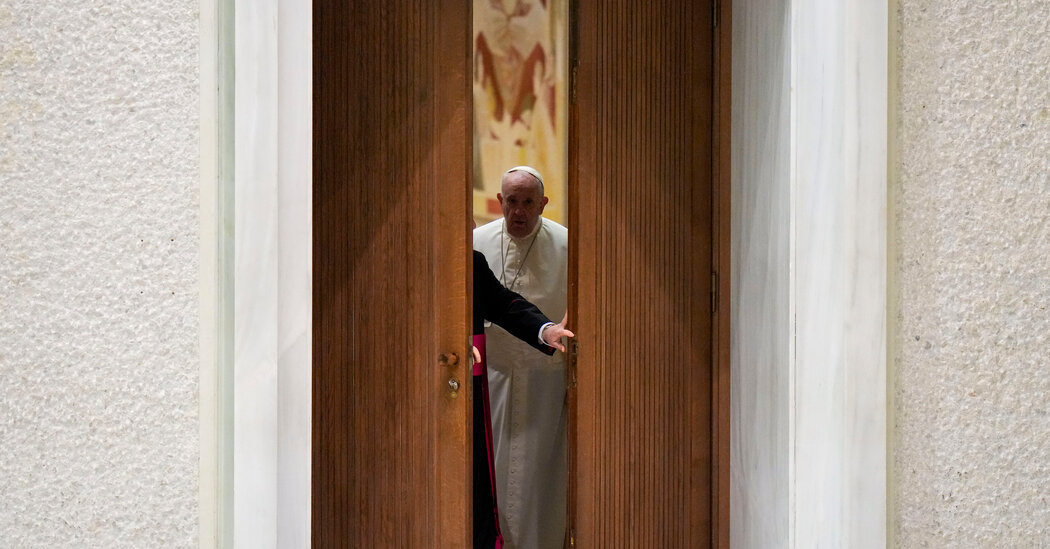Italy has so far resisted calls for an independent investigation into how the Roman Catholic church has handled these cases.
ROME — Catholic groups and abuse survivors on Tuesday called on the Roman Catholic Church in Italy, which has yet to reckon with the scourge of sexual abuse by priests, to create an independent commission to investigate how the crisis has been handled.
In a number of countries — including Australia, France, Ireland and the United States — the church has allowed some scrutiny of its actions. But so far, the church in Italy has resisted calls for an independent inquiry, even after Pope Francis in 2019 held a landmark meeting on clerical sexual abuse and called “for an all-out battle against the abuse of minors.”
“Italy is an anomaly,” said Francesco Zanardi, a clerical abuse survivor and president of Rete l’Abuso, the country’s most outspoken victims’ rights group, which has independently tracked more than 350 cases of pedophile priests in the Italian justice system.
An investigation would be “the first step toward justice to which the victims and families are entitled,” said, Ludovica Eugenio, a journalist for a Catholic weekly magazine who is part of the newly formed group, which doesn’t have a name yet but is using the hashtag #ItalyChurchToo.
Speaking at a news conference Tuesday, Ms. Eugenio said the consortium wanted the church in Italy to “assume responsibility for the abuses, the cover-ups and the abandonment of the victims” who were not heard or given compensation. It also called on the Italian Parliament to improve existing legislation and draft new laws to make it easier for cases of abuse by priests to be reported and tried.
The Rev. Hans Zollner, one of the Vatican’ s top experts in safeguarding minors, said in an interview last week that even in Italy, where the church still had “a sense of being untouchable,” the tide was turning.
“The church doesn’t have any choice any more. The public expects it,” Father Zollner said.
The calls by advocates and survivors — which include the opening of private church archives — follow recent revelations about clerical abuse in other countries. In Germany, a report issued last month put the retired Pope Benedict XVI into the spotlight. The report said Benedict had mishandled four cases of sexual abuse of minors while he was an archbishop in Germany, prompting Benedict to ask for forgiveness, while also denying any wrongdoing.
In 2019, the United Nations Committee on the Rights of the Child criticized Italy for not sufficiently protecting minors from sexual exploitation. In particular, the committee expressed concern “about the numerous cases of children having been sexually abused by religious personnel of the Catholic Church” and the “low number of investigations and criminal prosecutions” of those crimes.
Any investigation should include cases of abuse of nuns and other forms of violence, said Paola Cavallari, a theologian and member of the fledgling group.
Paola Lazzarini, president of the group Women for the Church, said an investigation had to establish — and make public — individual responsibilities.
“The Catholic Church is a hierarchical church, in which the chain of command is very clear, yet when it comes to abuse, personal responsibilities become vague. This should no longer happen,” she said.
Church officials did not immediately respond to Tuesday’s calls for action. But the president of the Italian bishops conference, Cardinal Gualtiero Bassetti, said in a recent interview with an Italian newspaper that the church in Italy was “reflecting on launching an in-depth and serious survey of the Italian situation.” He did not offer details on what form the survey might take, and his mandate as head of the bishops conference ends in May.
Monsignor Lorenzo Ghizzoni, the Italian church’s top official responsible for protecting minors, said in a telephone interview last week that bishops in Italy had so far focused on education to prevent sexual abuse and on creating a network of people that victims could turn to. Listening centers where complaints could be received were also being established, he said.
“It’s not enough to do an investigation on numbers, statistics. We have to make available places where victims can go,” Father Ghizzoni said.
Several abuse survivors who spoke at Tuesday’s news conference said that at least in the past, church officials had not listened to their complaints.
“The truth is that I realized that the church really isn’t able to handle this kind of problem,” said Antonio Messina, who said he was abused for four years when he was a minor. .
He said that when he tried to bring his abuser to justice, in 2014, the prelates he turned to for help either didn’t believe him or tried to bribe him to keep quiet.
He is still glad he went public, he said.
“No amount of compensation can restore what has been taken away,” he said. “But if we can ensure that this does not happen to others, these bad stories can at least serve to change something in the church and in society, especially in Italy where the church is strongly rooted.”


























